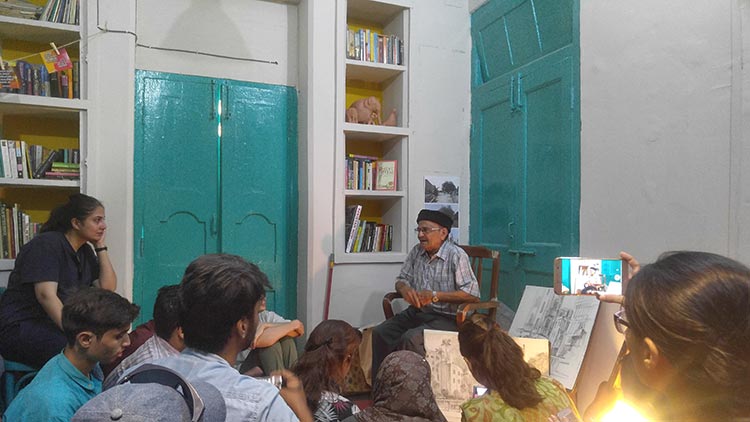Written by: Awais Khalid
Posted on: August 28, 2017 |  | 中文
| 中文
View of Kutchery Road and the revamped Pakistan Chowk, from the windows of Pakistan Chowk Community Centre
Pakistan Chowk, an area named after a mere roundabout, is located only a few kilometers away from the famous Empress market of Karachi. In the 1880s, the Hindu Shahani family envisioned it as the educational heart of Karachi, and Sindh College Association, D.J Science College and various student hostels were established here over the years. The Pakistan Law House was also located here, and was frequented by such luminaries as federal ministers for law, Khalid Anwer and Fakhruddin G. Ebrahim. Even Zulfikar Ali Bhutto was said to have visited this place, which had become a hub for discussing pressing academic and political issues. Gatherings at Café Sadi encouraged dialogue among the literati of the city, while the nearby Bholu Akhada bred wrestlers, such as Bholu Pehlevan. Thus, the Chowk has long remained a heritage site of great significance, bringing together people of varied cultural and religious backgrounds for debate and discussion.
In recent years, the Chowk has fallen victim to urban decay; graffiti along with political slogans and posters have been plastered on the walls and electricity pylons have become a common sight. The rise of printing presses in the vicinity brought in huge electric signboards, and as a result the beautiful colonial architecture receded into the background. The increased economic activity led to the growth of waste, with no proper means for disposal. The rising inequality between classes had led to the restriction of culture and arts to the private sphere, and with increased security issues, the space transformed over a few decades.
In the midst of this newfound chaos, a group of determined activists decided to form the Pakistan Chowk Initiative. As its first project, they worked to rehabilitate Pakistan Chowk’s ‘Aram Bagh Quarter.’ The aim was to reclaim this public space and give it back to the community for intellectual discourse and recreation.
On 11th December 2016, the Pakistan Chowk rehabilitation program was completed. The space had been remodeled with new benches, lamp posts, trees and dustbins. The benches were inscribed with the names of people who had made sacrifices for Pakistan, but had not been acknowledged in the mainstream because of their gender, religion, or race. The Chowk has now become a place where artists, writers and activists from the old town can collect every weekend, and share the community space.
After the completion of this phase, the Pakistan Chowk Initiative started working on their next project; the Pakistan Chowk Community Centre. On August 16th, 2017 the two room space of the Centre, located in the old building of Sultani Mahal was inaugurated. The purpose of this Centre is to provide a space for those arts and cultural activities, which cannot be carried out in the Chowk itself. It also serves as a space for public and intellectual discourse among the people of the old town.
In conversation with the founding member of the Pakistan Chowk Initiative, architect Marvi Mazhar, who dedicates her free time to this initiative, I realized the necessity of a space where people can just talk. She said, “You are not spreading social sciences; you are not talking about poetry, philosophy or literature. We don’t have a culture where we listen anymore. [Neither do we] talk about art, [or] talk about anthropology. It is very important for us to talk.”
She also mentioned the difficulty she has in encouraging people from the old town to visit the centre. “I want to bring in people from here. It is very easy for me to bring people from Clifton or Defence. But here there is an ego problem, as people do not come without formal invitations!” Another challenge faced by the Centre is its limited space, but this does not affect the determination of Marvi Mazhar, “I faced criticism as to why this space is so small? But I want to start small. We have used the word ‘Centre’ but actually this is my office!”

She also mentioned two other projects her team is working on; one is mapping the old town, and the second is ‘Gaer Sarkari Tareekh,’ which is recording oral histories. By speaking with families of the old town, who have been living there since before partition, the aim is to understand urban narratives as well as preserve vital knowledge.
The Pakistan Chowk Community Centre is located only 30 feet away from the Pakistan Chowk. It is open to public from 2:30 PM to 6:30 PM on weekdays, and from 3:00 PM to 8:30 PM on weekends. Its brightly painted walls, full bookshelves and floor seating, make it into an ideal space for small events. Already they have held a conversation with the journalist Aslam Khwaja about Shanta Bukhari, the first female trade unionist of Pakistan. I was lucky enough to attend the conversation held with watercolourist Ustad Abdul Hayee, which focused on the relationship between mentors and students.
Thus, if you want to engage in an enlightening conversation with a stranger, read a book in a public space, or even conduct your personal meetings here, the Centre is a good place for discourse within the community.
You may also like: